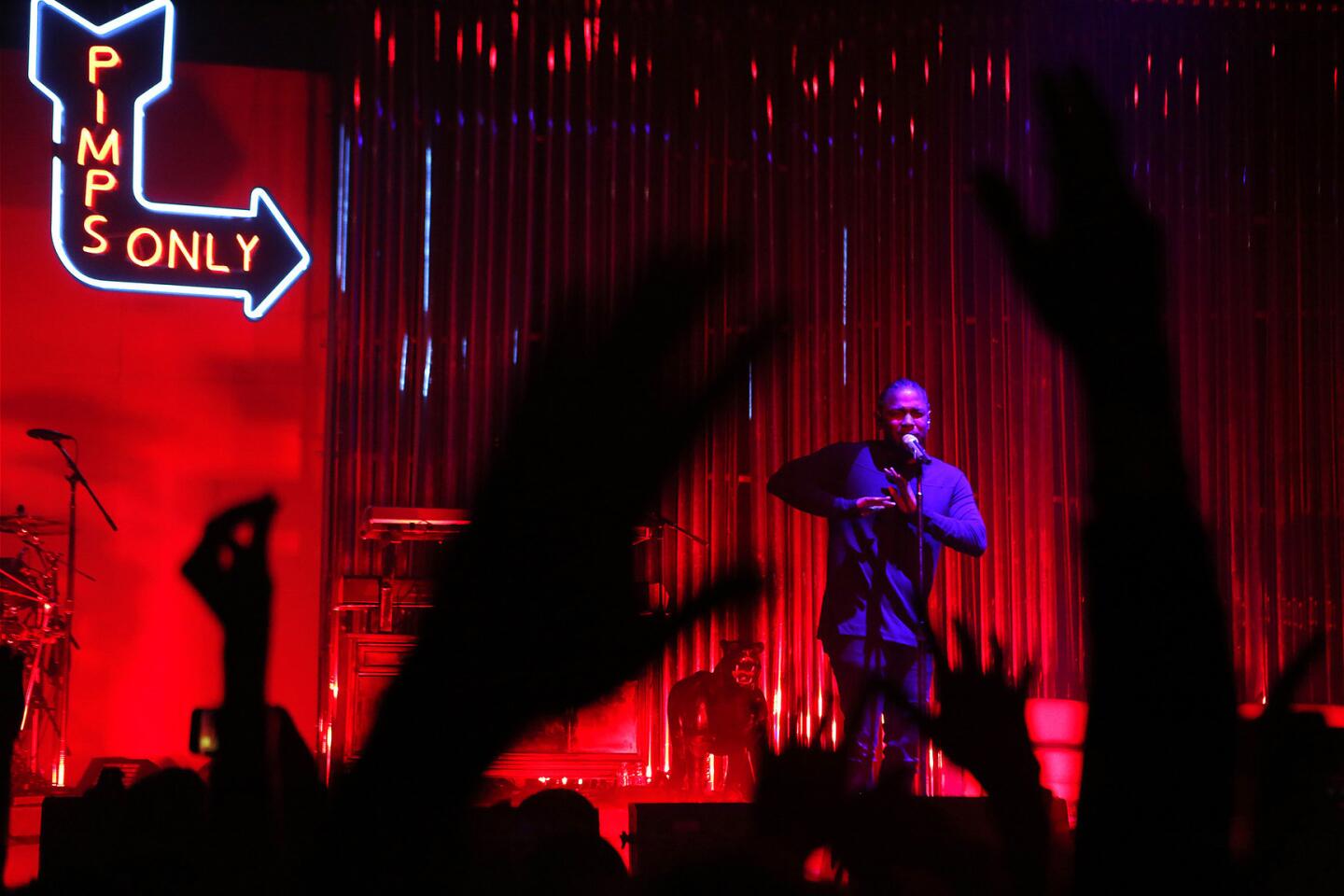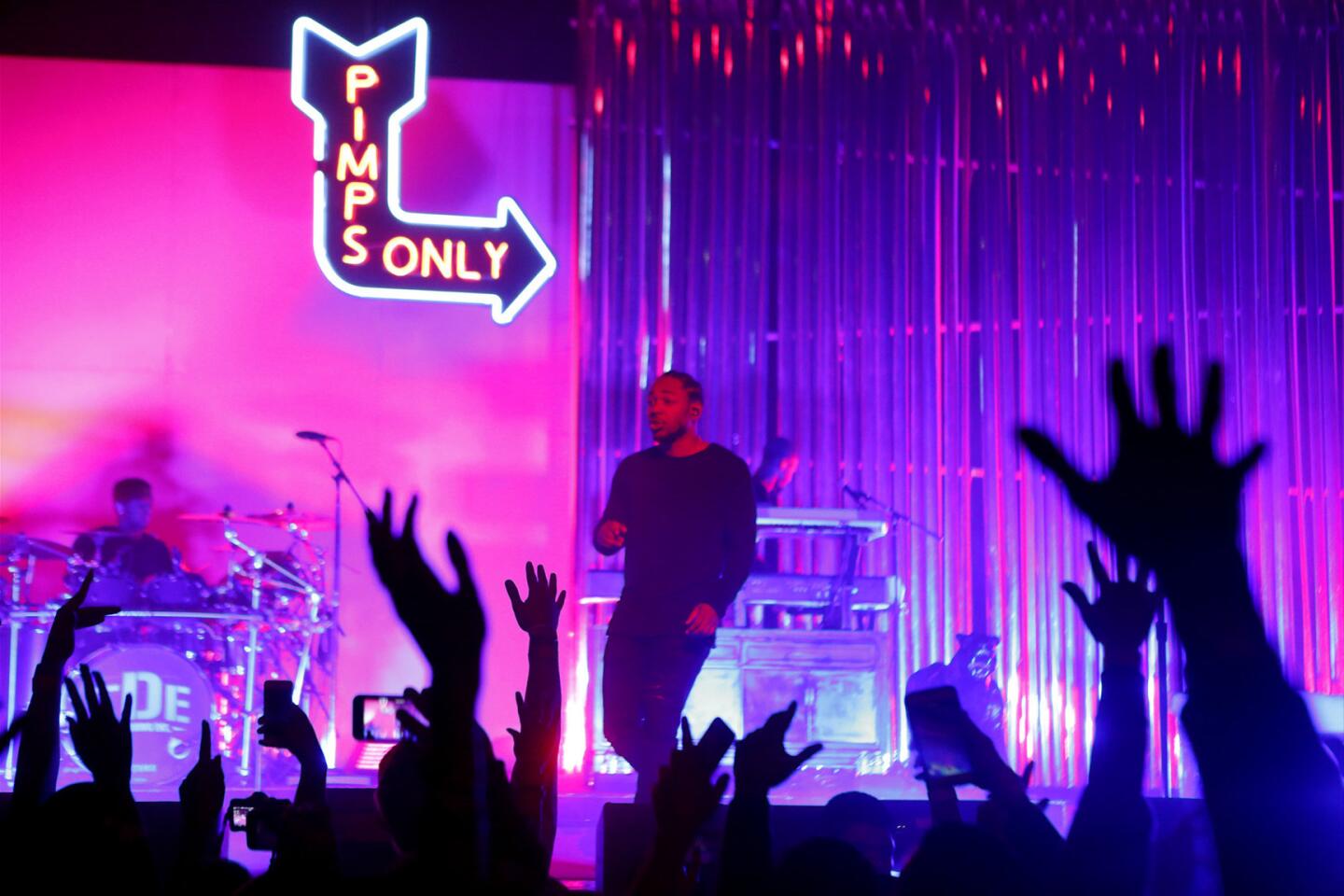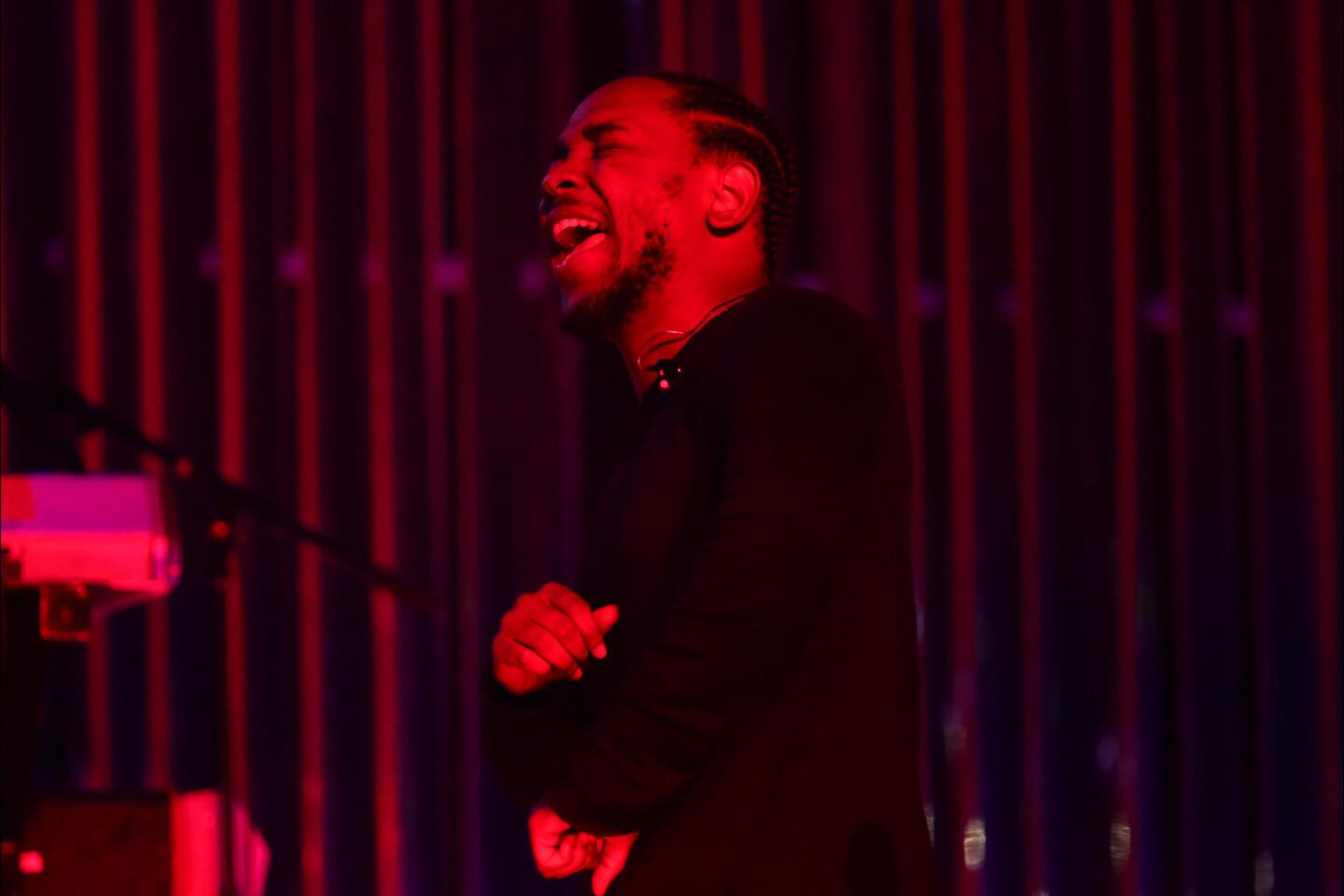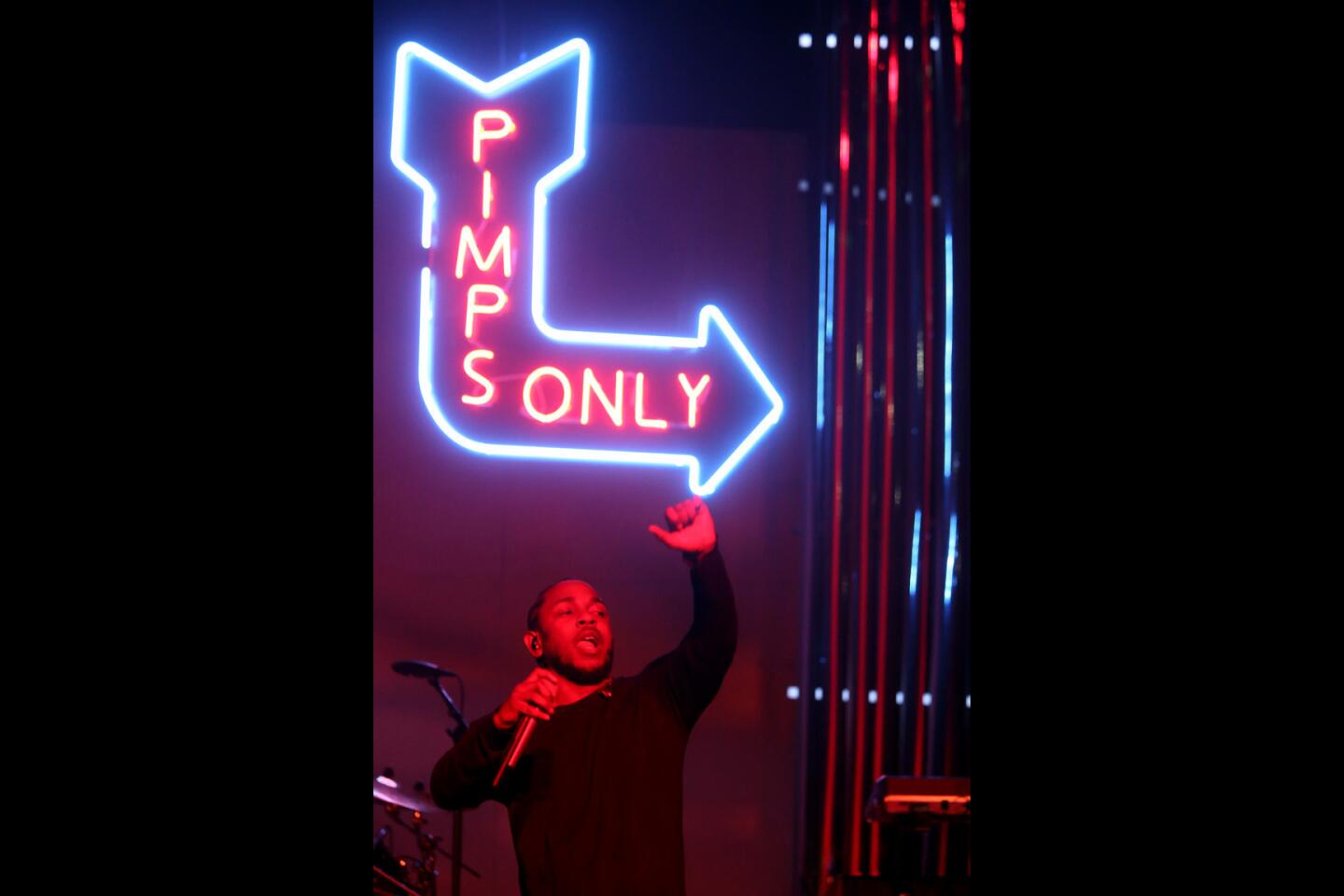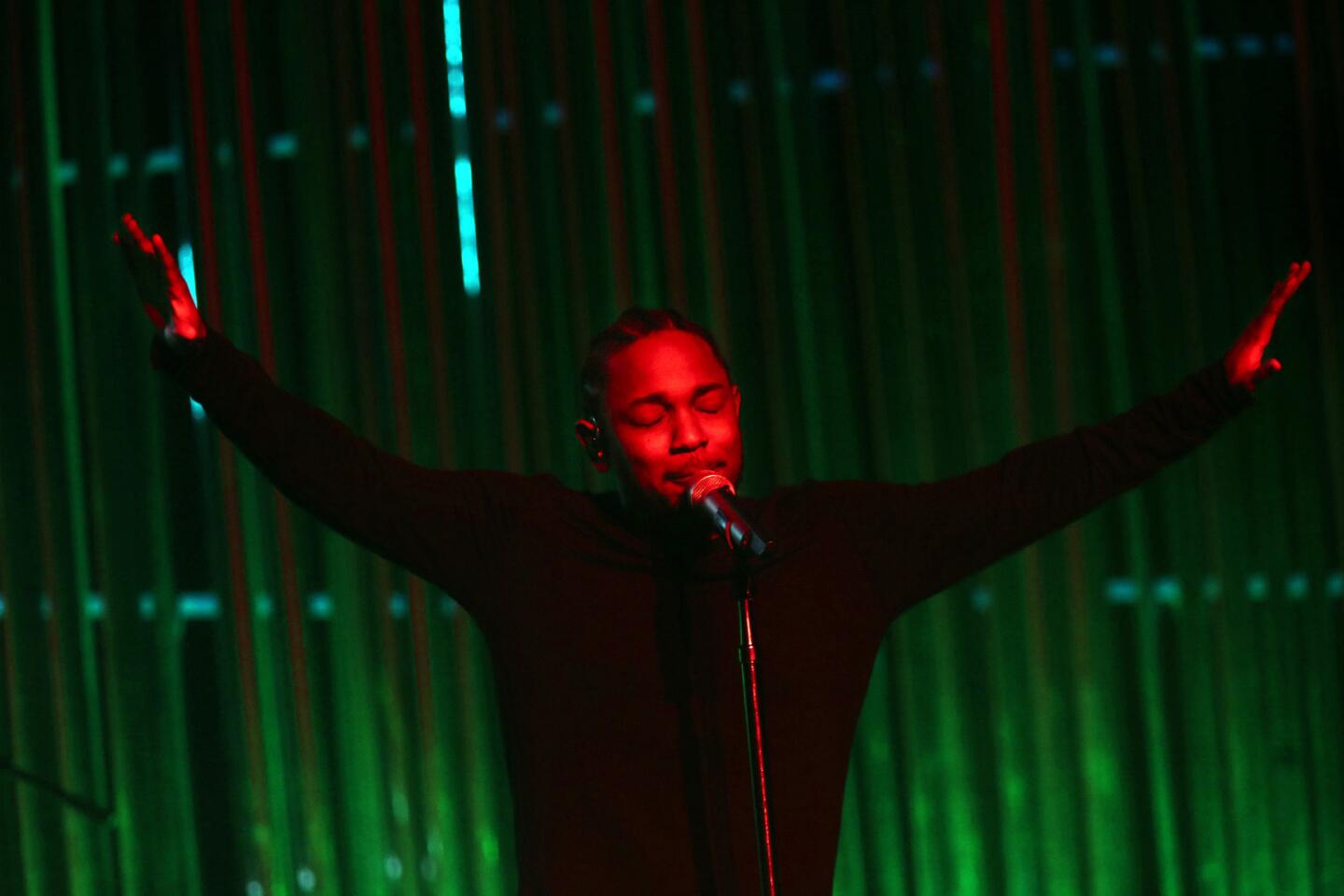Review: Kendrick Lamar brings Kunta’s Groove Sessions to the Wiltern
The first time I saw Kendrick Lamar play live, at New York’s Roseland Ballroom in February of 2013, he was cresting rapidly after a major label debut, “Good Kid, M.AA.D. City.” He was ferocious, alone except for his DJ, but a bit overwhelmed by a crowd reaction that felt ahead of itself, as much hope as loyalty.
How could we know him, and love him, that well yet? Later that year, playing the opening slot on Kanye West’s “Yeezus” tour at Barclays Center, Lamar was confident but out of step working with a live band that turned his music into an awkward blend of guitar rock and nineties hip-hop.
In early 2015, he released “To Pimp A Butterfly,” an album nobody has been able to ignore, though several have made the case (convincingly) that the album is bigger on ambition than pleasure. “Butterfly” is a dense compression of jazz, R&B, P-Funk and a dozen variations on MCing, speechifying and recitation, made largely with live instruments.
SIGN UP for the free Classic Hollywood newsletter >>
Last night, Lamar brought his brief “Kunta’s Groove Sessions” tour to the Wiltern, playing for a hometown crowd that’s watched him move in what feels simultaneously like slow motion and at light speed. After remarking several times how long it’s been since he played a place as small as the Wiltern — capacity right under 2,000 — he talked about meeting a fan who had started listening to Lamar in 2009, then in ninth grade, today a sophomore in college.
“I realized I’ve been raising a generation of little brothers and sisters,” Lamar said. He talked to the crowd several times, including one lengthy, slow speech that was longer than most of the songs in his set, which included all but two tracks from “Butterfly.”
This was the tone of the evening — full focus in the service of committed, looping attempts to maintain connection. This live show was a triumph not just for being energetic but for finally combining Lamar’s obsession into one coherent whole.
Backed by a line-up of drums, bass, keyboards and guitar that specialized in an unflowery version of jazz fusion, Lamar was as much a seasoned bandleader as an MC. This speaks to Lamar’s hybrid ambition; he’s a rapper with an acute if imprecise desire to push his role into territory he is not always familiar with.
During his longest speech he proposed that people connect with him, “because I’m trying to answer all these questions, just like you.” Lamar is a rapper from Compton who has to bear the historical burden of coming from a city that is both real and part of a collective, global narrative — like the South Bronx or Chicago or East London — but has no interest in being the G-Funk revival guy.
His band dropped not one, but two interludes borrowed from Earth, Wind and Fire, and the music only once leaned back on the soft click of a drum machine pattern. The mood was intense, and streamlined. After the show, looking at the set list, I was shocked to see that the show was split into three acts. I rarely see ninety minutes of music that feels so unbroken.
Lamar fired his words, spending most of the night at the lip of the stage and holding his ground, as if he might lose his slot at any moment. In a black form-fitting top and black jeans with one artful tear across the left thigh, Lamar was both at ease and fully engaged. As a live performer, Lamar doesn’t tinker with his vocal identity or alter his levels of intensity — that’s for the studio.
He’s a rapper with stage presence but unusually modest about his own voice. His obsession is getting the words out, as clearly and as hard as possible. At the end of “u,” Lamar extended an acapella chant into something closer to prayer than rapping, repeating the words, “loving you is complicated,” as if he would answer an implicit question simply by saying the words with enough force.
His stage setup included a neon arrow outlining the words “PIMPS ONLY” and a white couch bassist Tony “Chicago” Russell and guitarist Robert “Freaky Rob” Gueringer occasionally perched on. Lamar only approached the couch at the very end of the show, leaping up and down on it for a few seconds and then leaping off. (If Lamar can make this a recurring set piece, we can reclaim the couch stomp from Tom Cruise.)
When the body of the set was over, and Lamar hadn’t performed the track from “Butterfly” that has become its unofficial center, the crowd did something I can’t remember happening before. Rather than simply scream for an encore or chant Kendrick’s name — they’d already done that — they cut to the chase and put in a very specific order. In unison, as if everyone had discussed it on Wilshire before the show, the audience started chanting “We Gon’ Be Alright, We Gon’ Be Alright.”
After several minutes of this, Lamar and the band emerged, as the crowd continued. Lamar conducted the room, gesturing to bring the collective volume up, then down. This went on for a solid five minutes, in total, and then Lamar stopped. A beat later, the band launched into “Alright,” and he had made his point. He described his fans as “family” during the show, and he was home.
More to Read
The biggest entertainment stories
Get our big stories about Hollywood, film, television, music, arts, culture and more right in your inbox as soon as they publish.
You may occasionally receive promotional content from the Los Angeles Times.
